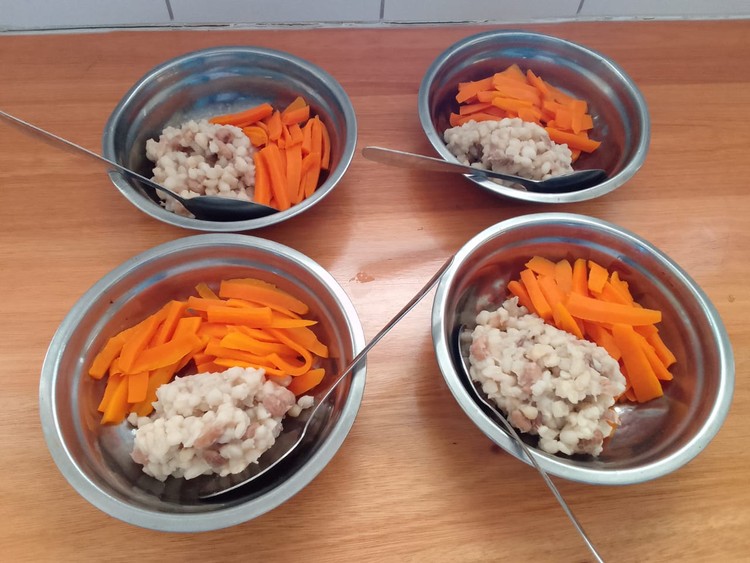
28 September 2023
Lunch at Gungqwana Junior Secondary School in Qumbu. Unlike many others, this school receives the full allocation of R3.05 per learner per meal. But principal Lulama Songelwa-Beje says it’s still not enough. Photo: Lulama Songelwa-Beje
Children in the Eastern Cape are desperately hungry and are not being fed enough at school.
The Department of Basic Education has a National School Nutrition Programme to provide learners with meals at schools. But some schools say the money they’re receiving is not enough. Sometimes they get less than the subsidy because learners without birth certificates are not counted in the allocation.
The official allocation from the Eastern Cape Department of Education per learner for one daily meal is R3.05 for primary schools, R3.65 for secondary schools, R7.35 for smaller schools and an additional 59c for breakfast for all schools in the 2023/24 financial year, according to spokesperson Malibongwe Mtima.
He said 1,359,419 learners were fed in the second quarter, at a cost of R408-million.
School meals in the nutrition programme must include protein, carbohydrates or starch, and fresh fruit or vegetables, according to the Department of Basic Education’s website.
Mtima said schools had all received funding in accordance with the 2023/24 budget and no schools had reported being unable to feed learners because of lack of funds.
But Corene Conradie, Eastern Cape regional coordinator for Gift of the Givers, told GroundUp she recently visited a primary school receiving much less than R3.05 per learner per day. The school, Toleni Primary near Butterworth, has about 120 learners.
Conradie said at schools she visits across the Eastern Cape, many can only serve small portions of pap. Sometimes schools give only a spoonful of food for a meal. Gift of the Givers is inundated with calls from schools for meat and vegetable donations to supplement their meals, she added.
“It is not enough per child,” Conradie said.
Research shows children who do not consume enough energy and nutrients are at risk of undernutrition, which has physical and intellectual effects.
Nontuthulezo Dawedi, the principal of Mfundweni Primary School in Ngqeleni, said she also receives much less per learner per day for meals.
This is because some of their learners, who don’t have birth certificates, are not counted in the subsidy allocation.
That amount cannot cover sufficient food and the fuel needed to cook, both of which are expensive, she said.
“We need more funds so we can buy more food,” she said. “The servings are not enough.”
Breakfast for the approximately 160 learners is always a small amount of cereal, served without milk. Lunch two days of the week includes protein in the form of soup packs or pilchard. The other three days, there is no protein served, Dawedi said.
“They come to school hungry,” she said. “And then since the food is not enough, they go home hungry. It affects them. They are not performing as they should.”
Grade 10 learner Anathi Mathendela from Cofimvaba High School says no porridge is offered at her school.
The learners get their meal at 10am: rice, pilchards and cabbage on Mondays and Wednesdays, sour milk (Amasi) on Tuesdays; rice, chicken and chakalaka on Thursdays; and samp and beans on Fridays. She says portions are too small, with just one spoonful of rice. The only day she gets enough food is Friday because many learners don’t like the samp and beans.
“The food we are getting is very small. One cannot rely on one school meal every day.” She is one of five grandchildren in the household, which lives off social grants, and there is not always money for her to buy vetkoek or something else to supplement the school meal.
Anathi leaves her home before 6am to catch scholar transport. “When I get to school, I’m already hungry but I will have to wait until 10am for the three-to-five spoon meal. After that there’s nothing and the school ends at 3pm. I get home after 4pm, hungry as hell.”
Cofimvaba Primary School Grade 4 learner Lusindiso Booi says he does get porridge with sugar in the morning, but no milk. Children who arrive late miss the porridge, which is dished out at 7am.
Then at 9am they get their meal of chicken, rice and cabbage, amasi, pilchards, chicken livers or samp and beans.
But a teacher at the school said there is not enough food for the learners because learners without birth certificates are not included in the nutrition programme.
“In my classroom, out of 18 learners, six learners do not have birth certificates. And the fact that they do not have birth certificates also means that they are not getting the child support grant. Chances are, even at home there’s no food, meaning that the child only gets one meal a day here at the school. That is the sad reality,” said the teacher.
Gungqwana Junior Secondary School in Qumbu receives the full allocation of R3.05 per learner per day for lunch, and 59c for breakfast for its 120 students, according to school principal Lulama Songelwa-Beje.
But Songelwa-Beje said even this amount is not enough. The shops are far away, and taxis are expensive.
The school serves porridge for breakfast every day, and a varying menu for lunch. Although each meal has vegetables and protein, Songelwa-Beje said it’s a very small portion.
She said most families in the area are unemployed and rely on grant money, so school meals are sometimes the only food learners receive, and she needs more funding.
“It is a very, very difficult situation,” she said.